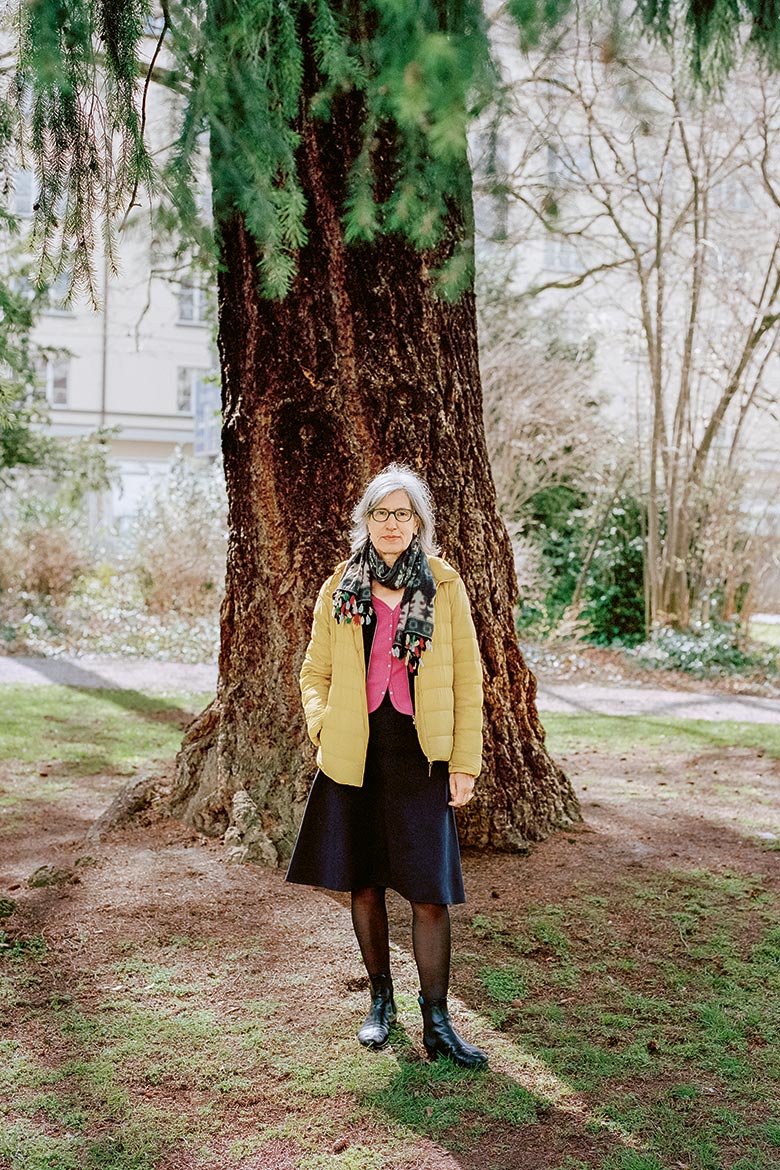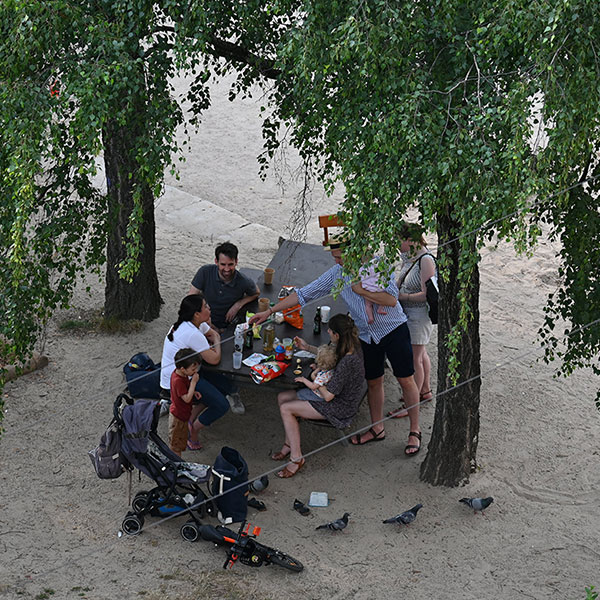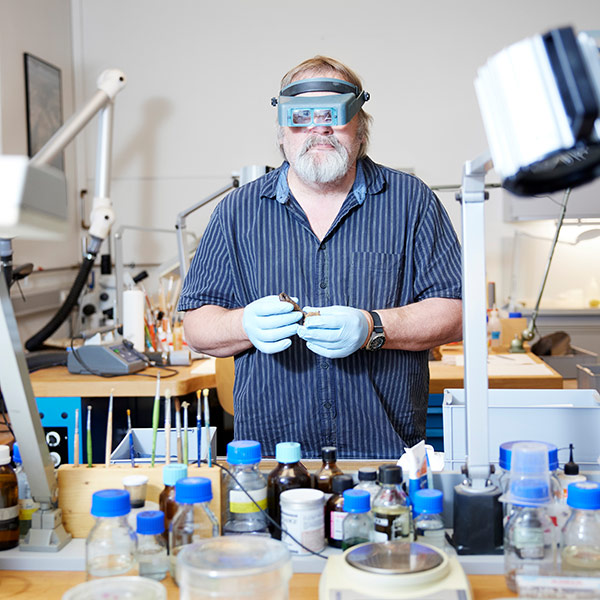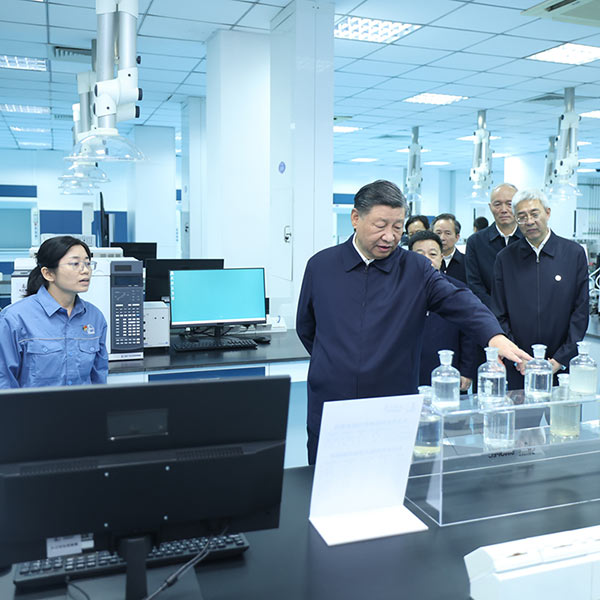Portrait
The science diplomat
As a child, Flavia Schlegel fantasised about becoming an ‘Alberta Schweitzer’. She did become a doctor, but later abandoned her stethoscope to serve society instead by becoming a bridge-builder between science and international politics. And even though she’s perfectly happy to be in Switzerland, a ‘safe haven’, one thing about her hasn’t changed: She still loves a challenge.

During Flavia Schlegelʼs years at UNESCO, Donald Trump became President of the United States, Russia became increasingly authoritarian, and China rose to the rank of global power. “As early as 2018, the fronts hardened”, she recalls. | Photo: Beat Schweizer
Today, Flavia Schlegel has cycled from her flat in the east of Bern to the city centre. She goes on to tell us why she prefers travelling on two wheels, also when she’s on holiday – such as on a bike tour from Bern to Marseille. “The pace is right. It’s not too fast, not too slow. And your senses open up, you’re aware of all kinds of things: noises, air temperature, the weather conditions”. Perhaps this kind of motion is a good metaphor for Schlegel’s life overall: steady, not too fast, not too slow. “I’m not someone who plans a lot. I didn’t plan any career for myself, either”. She simply grasped the opportunities as they presented themselves – and she did so successfully, as is proven by her career as a science diplomat.
From a hospice to the Federal Office of Public Health
Schlegel grew up in Sargans in the canton of St. Gallen in eastern Switzerland, in “a social-democratic, union-oriented, railway household”. She was often ill as a child, suffering from asthma, and felt lucky to have a doctor who was able to help her. This experience, she says, helped to determine her later choice of career. “I fantasised about becoming an ‘Alberta Schweitzer’ in Africa”, she says, laughing. So she studied medicine, and after graduating she got a job in Zurich’s first city hospice for AIDS victims. “It was there, as a young doctor, that I saw the limits of what medicine can do. Young people were dying because they didn’t have any clean syringes or because their sex lives didn’t conform to what was considered the norm”, she says, speaking with a sense of urgency that makes you realise how deep was the shock she experienced, even though almost 40 years have since passed. She recognised that instead of coping with the fate of individual human beings, she wanted to tackle public health issues, the relationship of the state to the individual, the role of science in the health system, and matters pertaining to justice and inequality in healthcare. As a result, she joined the Federal Office of Public Health (FOPH), where one of her tasks was running the ‘Stop AIDS’ campaign in Switzerland.
After a few years at the FOPH, she moved continent in 2002, working for three years as a science counsellor to the Swiss Embassy in Washington D.C. Her task was to promote Switzerland as a science location. It was not long after 9/11, and her focus was on how the terrorist attacks affected US research and education policy – such as the entry restrictions that were introduced. But she also organised visits by US science delegations to Switzerland, and established collaborations with assorted science organisations.
Swimming upstream
In 2005, Schlegel returned to the FOPH, this time as a deputy director, but once more in the midst of a crisis. Bird flu offered an initial hint of how the world would be turned upside down by a pandemic just 15 years later. “Even back then, there was a huge amount of pressure from both politicians and the media”, she says. After she appeared on the TV programme ‘Arena’ on 14 October 2005, she was subjected to intense attacks in the media. The tabloid newspaper ‘Sonntagsblick’, for example, claimed that Schlegel had wanted to be ‘Madame Bird Flu’ but had been unable to get her message across. But she had kept her cool during the programme, and the FOPH had her back. When asking her whether she finds crises appealing, she searches for the appropriate answer: “Time and again, I need a change and new tasks. Building things up and changing things are what I do. ‘Steady state’ is not my thing”.
In 2008, it was building something up that was once again required of her. Schlegel was appointed the director of the new Shanghai science centre for Swissnex, the organisation that represents Swiss business and science abroad. The general mood was again one of crisis, because the collapse of Lehman Brothers was shaking the foundations of the financial world. “Swissnex got two-thirds of its funding from third-party sources, so we got nervous”, she recalls. But her fears were unfounded. Many people still wanted to invest in China, which at the time was slowly opening up as a new global player.
Schlegel took advantage of this openness and began organising events at the interface between science and culture – such as ‘barbecue lectures’, a series of events held in a museum featuring Chinese and Swiss artists and researchers. Here, too, Schlegel acted as a promoter of Switzerland as a business location, helping to further collaboration between China and Switzerland in research and innovation. Looking back, she says: “We kept finding ourselves in unfamiliar but exciting situations, especially when there were linguistic misunderstandings”. She was able to make herself understood, more or less, “but I naturally didn’t have a background in sinology”.
The next station in her career was easier, at least in terms of language. After five years in Shanghai, she was appointed Assistant Director General of UNESCO, with official support from Switzerland. This took her to Paris, to a job with a different dimension altogether. She was no longer representing only Switzerland’s interests, but all of UNESCO’s member states. “The whole world was on my desk”, she says. Her development agenda brought topics such as biodiversity, water, the climate and ultimately also digital transformation into focus. The geopolitical situation also became more intense during her time in Paris. Donald Trump was elected President of the USA, China emerged as a world power, and Russia became more authoritarian. “In 2014, our meetings were still constructive”, she recalls. “But from 2018 onwards, the battle-lines hardened”. A decline in general solidarity became evident to her, as well as a process of polarisation.
A bit of a stranger
In 2019, Schlegel returned to her native country. Since then, she has worked as an independent consultant for universities, the authorities and NGOs. “After 10 years abroad, I felt I’d become a bit of a stranger”, she says. As someone with an Italian mother, she doesn’t feel primarily Swiss: “I see myself first and foremost as just a citizen – perhaps more as a European citizen. It’s European music and literature that have shaped me”. But she adds that she appreciates living in a country where democracy “more or less” functions. “I’m glad that I was in Switzerland during the pandemic”, she says. “I was very grateful that I was always able to go jogging”.
Standing still is no option for her: “What drives me on is an interest in new knowledge, in living in a manner that upholds justice and equality, and doesn’t just rely on technological solutions”, she says. Schlegel describes herself as a “parallel reader”, and there are several books on her bedside table: There’s ‘Karl Marx’s Ecosocialism’ by the best-selling Japanese author Kohei Saito, and ‘Why fish don’t exist’ by Lulu Miller – a mixture of biography, autobiography, philosophy and psychology. As Schlegel puts it, this is “literature that deals with life and scientific knowledge”.
Even here, in the sedate city of Bern, with its view of her beloved mountains, challenges still excite her. “I’m now learning to play the dulcimer”, says Schlegel. “The sound fascinates me, as does its history”, she says. And then she tells us about all the different cultures where we find the dulcimer. “It’s an aesthetic experience”.




